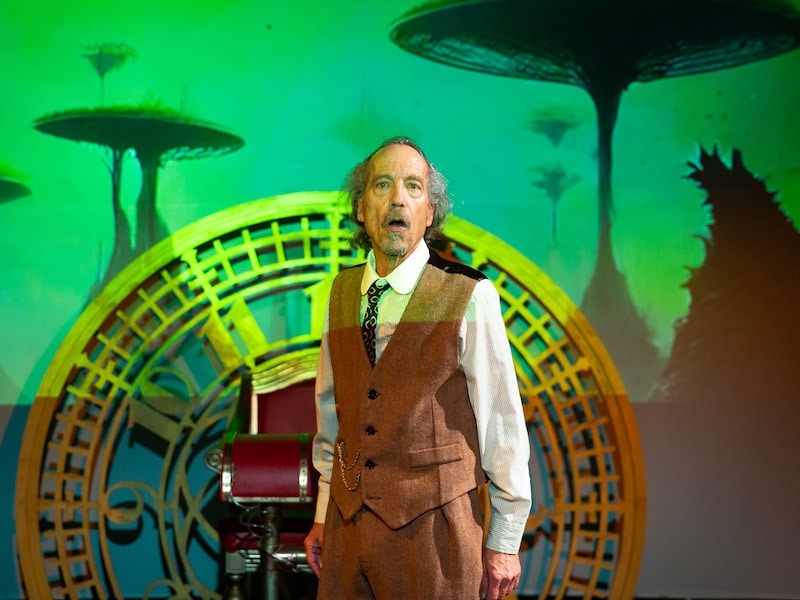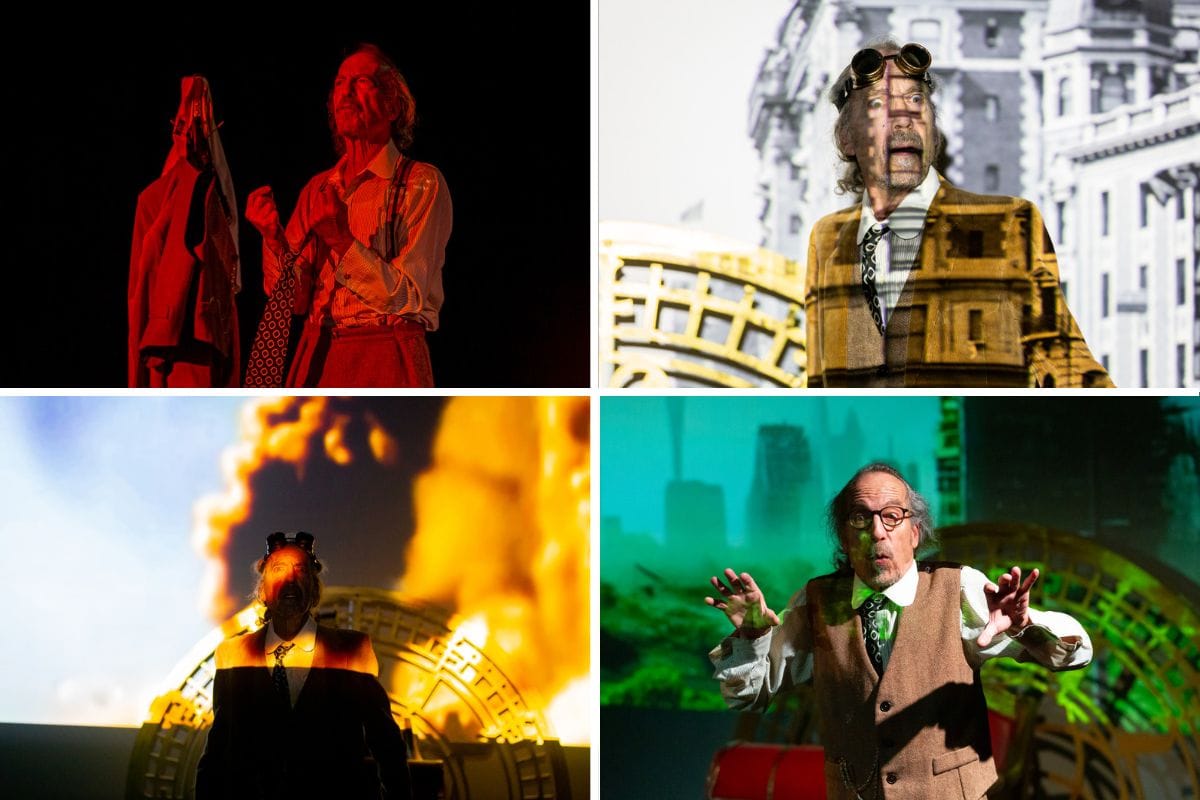H.G. Wells once said, “We all have our time machines, don’t we. Those that take us back are memories… And those that carry us forward, are dreams.”
In 1895, Wells’ novel The Time Machine became an overnight sensation. The story has since been made into two films, two series, comic books, and has even inspired fiction. (Let’s not forget Doctor Who‘s TARDIS.) Ron Litman is superb as The Professor in Scena Theatre’s first-rate adaptation of the science fiction classic. The script is by Litman and Scena Artistic Director Robert McNamara, who also directs.
Wells was a major figure of the early 19th century: novelist, historian, and public intellectual. From a working-class background, he became a draper’s assistant, which he hated, and later a teacher. When his father’s business failed, his mother became a servant. Perhaps this influenced his political beliefs; he was a socialist and a pacifist, and at one time a member of the Fabian Society.

Known (along with Jules Verne) as “the Father of Science Fiction,” Wells wrote some of the foundational texts of the genre: The Time Machine, (1895), The Invisible Man (1897), and The War of the Worlds (1898). A true visionary, he also foresaw, among other things, global warming, aerial flight and bombing, mass surveillance, germ warfare, radio, TV, video, the Internet, the atom bomb, fallout and radioactive waste, cosmetic surgery, and chemical weapons.
He had relationships with many of the most significant fin de siècle writers: Henry James, Ford Madox Ford, Stephen Crane, and Joseph Conrad. Conrad, who labeled him a “romancier du fantastique,” summed up Wells’ character when their friendship ended: “The difference between us, Wells, is fundamental. You don’t care for humanity but think they are to be improved. I love humanity but know they are not.”
Despite the fact that today science fiction dramas have been turned into movies with CGI, mesmerizing special effects, and highly sophisticated scripts, Wells’ work still has relevance and power. The pandemic, war, plagues, and political discord of today render this an excellent time to revisit Wells’ stark vision of the consequences of unbridled capitalism.
We first see an image of Times Square at the turn of the century. The empty Time Machine, a handsome contraption in red and gold, sits at the center of the stage (the set design is by Carl Gudenius and Michael C. Stepowany).
A mashup of songs about time blasts into the audience. An LSD-like trip explodes on the screen, full of strobe lights and eerie sounds. Sound design, video, and original music (all by Tom Pile) are exceptional. Lighting (by Michael C. Stepowany) perfectly enhances the videos. Litman wears the archetypal academic’s outfit: a jacket with elbow pads and trousers, and a pair of steampunk-style glasses (costume design by Alisa Mandel).
As we see 1919 Times Square again, a disheveled Ron Litman bursts out of the machine onto the stage, ready to tell us his story. “I have lived such days,” he says, “as no man has lived before.” He crawls back into the machine.
As he travels, we see images of the Great War, the Crash of 1929, Hitler, Stalin, the atomic bomb, V-day, and other historical events. He lands in the year… 801,702.

He first meets the Eloi, a childlike, beautiful race, although not, it seems, particularly intelligent. Litman’s acting is especially fine here, as we see the smiles of the elfin Eloi through his eyes. And there is another race of creatures, who live underground — the Morlocks — hideous beings with “pallid, ugly” faces, and “large, bright” eyes.
As the Professor watches the Eloi swimming, he saves one, a female, who appears to be drowning. He has made a friend, it seems, only to endure another crushing discovery: the Time Machine is gone!
The Eloi are terrified of the Morlocks, who come out only at night. The Professor’s friend, Weena, is terrified of the “Black Nights,” so they hide in a gigantic green building that turns out to be a museum.
The script is structured around the Professor’s growing affection for Weena, and the danger posed by the terrifying Morlocks.
During his journey through time, he expresses his thoughts about the universe:
Looking at these stars suddenly dwarfed my own troubles and all the gravities of terrestrial life. I thought of their unfathomable distance, and the slow inevitable drift of their movements out of the unknown past into the unknown future.
Despite this godlike detachment, we find in The Time Machine that Wells does indeed care about the human race. He cares about it very much.
Running Time: 75 minutes, no intermission.
The Time Machine plays through November 13, 2022 (Thursday to Saturday at 7:30 pm and Sunday at 3:00 pm), presented by Scena Theatre performing in Lab I at Atlas Performing Arts Center, 1333 H St. NE, Washington, DC. Purchase tickets ($15–$35) online.
COVID Safety: Masks are required to be worn by all audience members while in performance spaces (i.e. watching the show). Masks may be optional in other areas of the building, including lobbies. The use of N95 masks is encouraged. Atlas Performing Arts Center’s complete COVID Health and Safety Policy is here.
The Time Machine
Story by H.G. Wells
Adapted by Robert McNamara & Ron Litman
Directed by Robert McNamara
Cast
Ron Litman
Creative Team
Carl Gudenius (Set Designer), Alisa Mandel (Costume Designer), Michael Stepowany (Lighting Designer), Tom Pile (Videos / Visuals), Denise Rose (Sound Design), Anne Nottage (Assistant Director), TBA (Stage Manager), and Gabriele Jakobi (Dramaturg & Resident Director).
SEE ALSO:
Scena Theatre to premiere play based on H.G. Wells’ ‘Time Machine’ (news story, October 21, 2022)




